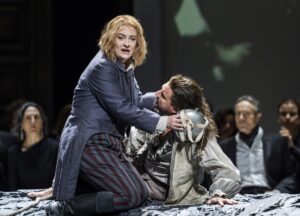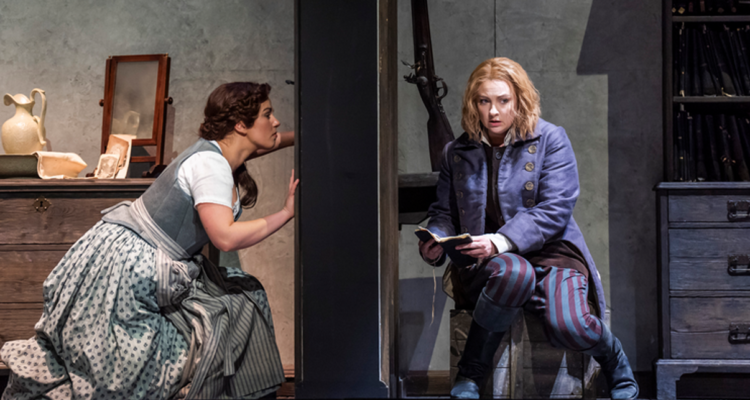Beethoven’s only opera, Fidelio, is often seen as a “problem” piece. It has wonderful music, starting with the overture so often played as a concert piece. The story, of wife Leonora who disguises herself as the male Fidelio to save her political prisoner husband Florestan, feels way ahead of its (1806) time. However, its mix of singing and fairly long sections of spoken dialogue make the action stop-start, and the opera often seems much more about ideas (Freedom, Fidelity, Courage) than story. Its two acts are also disjointed – plotlines from the first act are dropped in the second, and Florestan doesn’t appear in the first act at all.
Successful productions need a strong director to make Fidelio compelling and dramatic rather than worthy and clunky.The Royal Opera House’s production, sadly, did not get that director.
Tobias Kratzer makes the curious choice of playing Act 1 (set in the prison grounds) fairly traditionally, but blandly. Staging the overture to provide the back story of how prison worker Marcelline falls in love at first sight with Fidelio is also strange – the opera’s focus is elsewhere, and it dampens our enjoyment of the overture itself.

Overall, the first act lacks the sense of menace needed to propel the audience to Act 2, set deep below ground where prisoner Florestan is chained and awaiting certain death before his wife saves him. Kratzer plays the second act in modern dress and under bright lights, with the entire chorus on stage watching most of the action dispassionately, before turning the now-freed married pair into an over-hyped celebrity couple who walk off stage to the flashes of paparazzi. Apparently, this represent our world’s lack of empathy towards those who stand up for what they believe in, at least until our heroes are safe from danger. But the action is clumsy (e.g. singers tripping over the set’s central boulder), the ideas unclear, and the relationship with Act 1 non-existent.
Musically this is a more successful event. Alexander Soddy conducts the ROH orchestra with energy, giving the score a spiky, insistent quality with lots of instrumental detail. He slows down the tempo to allow great moments like Act 1’s Prisoner’s chorus and Florestan’s aria Gott! Welch Dunkel hier! in Act 2 to breathe.
Jennifer Davis makes a compelling Fidelio, singing Abscheulicher, wo eilst du hin with real power and pathos. Christina Gansch is even better as Marcelline, and has real chemistry with Davis – their scenes together are all highlights. The men fare less well – Peter Rose was under the weather and so his Rocco lacks the authority it needs. Eric Cutler definitely looks the part as Florestan, but feels underpowered musically and occasionally gets drowned out by the orchestra. Jocken Schmeckenbecher’s Pizarro is more of a pantomime dame than the menacing villain he needs to be.
The ROH chorus are excellent as always, each managing to look engaged when their faces were blown up to billboard size and projected above the action. Given the action in question, this shows acting of the highest order!
Opera in two acts, composed by Ludvig van Beethoven
Libretto by Joseph Sonnleithner, Stephan von Breuling and George Friedrich Treitschke after Jean-Nicolas Bouilly’s
French libretto Leonore, ou l’amour conjugal
Conducted by Alexander Soddy
Production by Tobias Kratzer, revived by Anja Kuhnhold
Cast includes Jennifer Davis, Eric Cutler, Peter Rose, Christina Gansch, Jochen Schmeckenbecher, Michael Gibson
Playing until 26th October 2024
Running time: 2 hours 35 minutes including interval
Photo credit: Tristram Kenton

